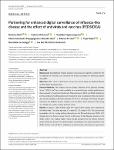Partnering for enhanced digital surveillance of influenza‐like disease and the effect of antivirals and vaccines (PEDSIDEA)
Rath, Barbara
Maltezou, Helena C.
Papaevangelou, Vassiliki
Papagrigoriou‐Theodoridou, Maria‐Alexandra
Alchikh, Maren
Myles, Puja
Schweiger, Brunhilde
PEDSIDEA Network
Background
Standardised clinical outcome measures are urgently needed for the surveillance of influenza and influenza‐like illness (ILI) based on individual patient data (IPD).
Objectives
We report a multicentre prospective cohort using a predefined disease severity score in routine care.
Patients/Methods
The Vienna Vaccine Safety initiative (ViVI) Disease Severity Score (“ViVI Score”) was made available as an android‐based mobile application to three paediatric hospitals in Berlin and Athens between 2013 and 2016. Healthcare professionals assessed ILI patients at the point of care including severity, risk factors and use of antibiotics/antivirals/vaccines. RT‐PCR for influenza A/B viruses was performed at the Hellenic Pasteur Institute and the Robert Koch Institute. PCR testing was blinded to severity scoring and vice versa.
Results
A total of 1615 children aged 0‐5 years (54.4% males) were assessed at the three sites. The mean age was 1.7 years (SD 1.5; range 0‐5.9). The success rate (completion of the scoring without disruption to the ER workflow) was 100%. ViVI Disease Severity Scores ranged from 0 to 35 (mean 13.72). Disease severity in the Berlin Cohort was slightly higher (mean 15.26) compared to the Athens Cohorts (mean 10.86 and 11.13). The administration of antibiotics was most prevalent in the Berlin Cohort, with 41.2% on antibiotics (predominantly cefuroxime) as opposed to only 0.5% on neuraminidase inhibitors. Overall, Risk‐adjusted ViVI Scores were significantly linked to the prescription of both, antibiotics and antivirals.
Conclusions
The Risk‐adjusted ViVI Score enables a precision medicine approach to managing ILI in multicentre settings. Using mobile applications, severity data will be obtained in real time with important implications for the evaluation of antiviral/vaccine use.
Dateien zu dieser Publikation

